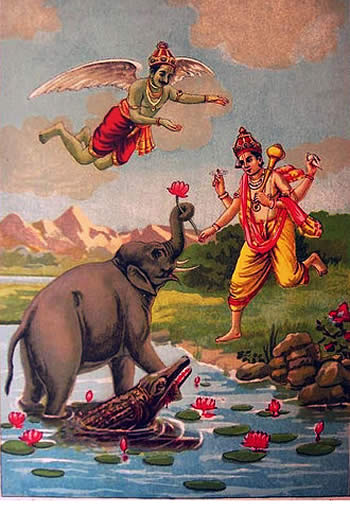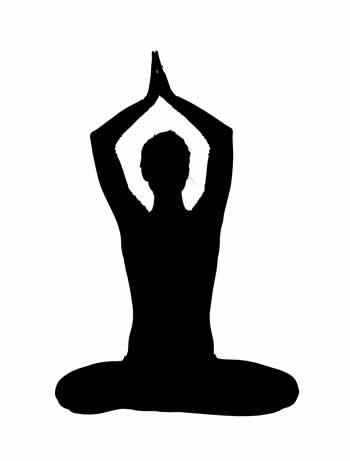Moksha- the Enlightenment or Liberation of Human
 Gajendra Moksha (pictured). The elephant Gajendra enters a lake where a crocodile (Huhu) clutches his leg and becomes his suffering. Despite his pain, Gajendra constantly remembers Vishnu, who then liberates him. Gajendra symbolically represents human beings, Huhu represents sins, and the lake is saṃsāra.
Gajendra Moksha (pictured). The elephant Gajendra enters a lake where a crocodile (Huhu) clutches his leg and becomes his suffering. Despite his pain, Gajendra constantly remembers Vishnu, who then liberates him. Gajendra symbolically represents human beings, Huhu represents sins, and the lake is saṃsāra.
Moksha is a term in Hinduism & other Indian religions for various forms of emancipation, enlightenment, liberation, and release. Moksha is freedom from ignorance: self-realization, self-actualization and self-knowledge.
Gajendra Moksha (The Liberation of Gajendra)
Gajendra Moksha is a Puranic legend from the the Bhāgavata Purāṇa, a sacred book in Hinduism. Most of the Bhagavata Purana consists of Shuka reciting the story to the dying king Parikshit. Shuka is the son of the sage Vyasa (credited as the organizer of the Vedas and Puranas) and the main narrator of the Bhagavata Purana.
There was once an elephant named Gajendra who lived in a garden called Ṛtumat. This garden was located on Mount Trikuta, the "Three-Peaked Mountain." Gajendra ruled over all the other elephants in the herd. One day as usual he went to the lake near by to pick lotus flowers to offer prayer to Lord Vishnu. Suddenly, a crocodile living in the lake attacked Gajendra and caught him by the leg. Gajendra tried for a long time to escape from the crocodile's clutches. All his family members, relatives and friends gathered around to help him, but in vain. The crocodile simply would not let go. When they realised that ‘death’ had come close to Gajendra, they left him alone. He trumpeted in pain and helplessness until he was hoarse. As the struggle was seemingly endless and when he had spent his last drop of energy, Gajendra called to the god Vishnu to save him, holding a lotus up in the air as an offering.
Hearing his devotee's call and prayer, Vishnu rushed to the scene. As Gajendra sighted the god coming, he lifted a lotus with his trunk. Seeing this, Vishnu was pleased and with his Sudharshana Chakra, he decapitated the crocodile. Gajendra prostrated himself before the god. Vishnu informed Gajendra that he, in one of his previous births, had been the celebrated King Indradyumna, a devotee of Vishnu, but due to his disrespect to the great Sage Agastya, he had been cursed to be reborn as an elephant.
Because Indradyumna had been devoted to Lord Vishnu, the god had him born as Gajendra and made him realize that there is something called Kaivalya which is beyond Svarga and Urdhva Loka, the realm of the gods. Indradyumna could attain Moksha finally when he (as Gajendra) left all his pride and doubt and totally surrendered himself to God.
Symbolic Meaning
 In myths and temples of India, Sarasvati appears with swan. Sarasvati is the Hindu goddess of knowledge, learning and creative arts, while swan is a symbol of spiritual perfection, liberation and moksa. The symbolism of Sarasvati and the swan is that knowledge and moksa go together.
In myths and temples of India, Sarasvati appears with swan. Sarasvati is the Hindu goddess of knowledge, learning and creative arts, while swan is a symbol of spiritual perfection, liberation and moksa. The symbolism of Sarasvati and the swan is that knowledge and moksa go together.
The tale of Gajendra has great symbolic value: Gajendra is the man, the crocodile is sin, and the muddy water of the lake is Saṃsāra (endless chain of karma in this world). The symbolic meaning of Gajendra moksha is that materialistic desires, ignorance and sins create an endless chain of karma in this world and are similar to a crocodile preying upon a helpless elephant stuck in a muddy pond. Humans are thus stuck in the world until the day when they can look beyond everything in this creation and ultimately submit themselves to the supreme being, God.
Mokṣa in this life: Attributes of liberated individual
In Hinduism, liberation and freedom reached within one's life is referred to as jivanmukti, and the individual who has experienced this state is called jivanmukta (self-realized person). Jivanmukti is a state that transforms the nature, attributes and behaviors of an individual.
According to Naradaparivrajaka Upanishad,
the liberated individual shows attributes such as:
- he is not bothered by disrespect and endures cruel words, treats others with respect regardless of how others treat him;
- when confronted by an angry person he does not return anger, instead replies with soft and kind words;
- even if tortured, he speaks and trusts the truth;
- he does not crave for blessings or expect praise from others;
- he never injures or harms any life or being (ahimsa), he is intent in the welfare of all beings;
- he is as comfortable being alone as in the presence of others;
- he is as comfortable with a bowl, at the foot of a tree in tattered robe without help, as when he is in a mithuna (union of mendicants), grama (village) and nagara (city);
- he doesn’t care about or wear ṣikha (tuft of hair on the back of head for religious reasons), nor the holy thread across his body. To him, knowledge is sikha, knowledge is the holy thread, knowledge alone is supreme. Outer appearances and rituals do not matter to him, only knowledge matters;
- for him there is no invocation nor dismissal of deities, no mantra nor non-mantra, no prostrations nor worship of gods, goddess or ancestors, nothing other than knowledge of Self;
- he is humble, high-spirited, of clear and steady mind, straightforward, compassionate, patient, indifferent, courageous, speaks firmly and with sweet words.
 Mokṣa is a key concept in Yoga, where it is a state of “awakening”, liberation and freedom in this life.
Mokṣa is a key concept in Yoga, where it is a state of “awakening”, liberation and freedom in this life.
Jivanmukta and Paramukta
A jivanmukta is someone who, in the Advaita Vedanta philosophy of Hinduism, has gained and assimilated infinite and divine knowledge and power and gained complete self-knowledge and self-realisation and attained kaivalya or moksha (enlightenment and liberation ), thus is liberated with an inner sense of freedom while living and not yet died. The state is the aim of moksha in Advaita Vedanta, Yoga and other schools of Hinduism, and it is referred to as Jivanmukti (Liberation or Enlightenment).
A Jivanmukti is also called atma-jnani (self-realized) because they are the knowers of their true self (atman) and the universal self hence also called as Brahma-Jnani. At the end of their lives, jivanmuktas attains Paramukti (final liberation) and becomes Paramukta. Jivanmukta experience enlightenment and liberation while alive and also after death ( i.e., after becoming paramukta).